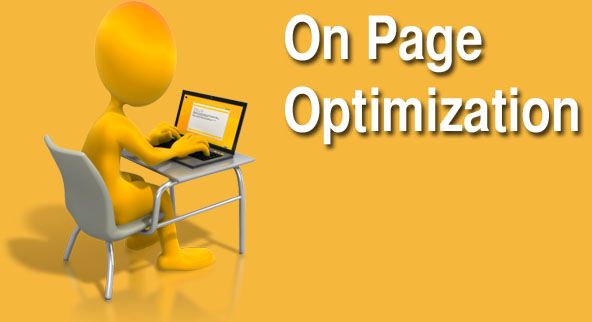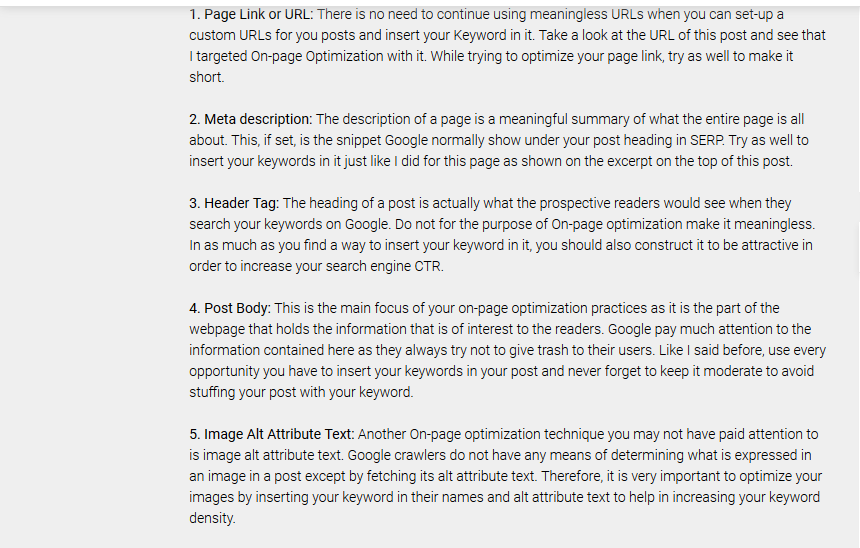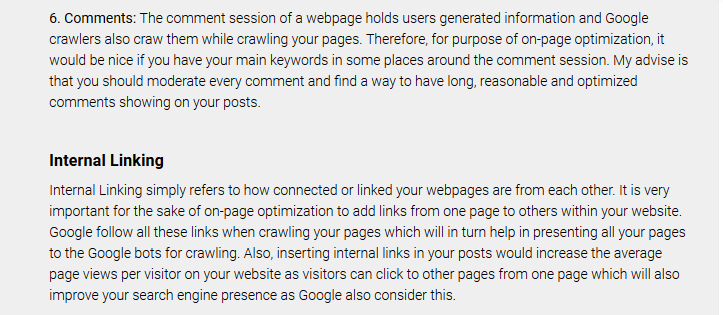On-Page Optimization: Get your blog post on every first page
technology·@da-primate·
0.000 HBDOn-Page Optimization: Get your blog post on every first page
 Like I always say, "SEO is the Ultimate Secret to Success in Blogging". This post contains everything you need to know about On-Page Optimization which would help you get your posts on Google first page if correctly applied. What is the need of writing a post if people would not get to read it? Blogging will only give you the kind of life you aspire to get through it if you are able to continuously get a reasonable amount of organic traffic to your blogs. The simple secret to success in blogging is the continuous creation of quality blog posts. You would need this because even when you are able to get your posts in front of potential readers, would it be something they would benefit from? Would it make them to come back for more? I have trusted websites/blogs that I always like to go to any time I see them on Google SERP. You can only get people addicted to reading your blog posts when you have something they always benefit from. If you have been writing quality and informative blog posts, then with good On-page Optimization you would be able to get the bulks of organic traffic you have been missing. What is On-Page Optimization? On-Page Optimization simply means any SEO technique you apply directly or indirectly within a webpage to improve the position of the webpage on SERP (Search Engine Result Page). While doing On-Page SEO or On-page Optimization, you should be focused on how to get to the top using genuine SEO techniques rather than opting for black-hat methods which would definitely get back to haunt you within a short period of time. There are several On-page Optimization Practices which you may have read some before. These Include; Optimized meta tags/description Responsive webpage design Effective Keyword Density Optimized webpage loading speed Optimized page URLs Internal Linking Efficient Image Optimazation etc If we continue to mention other On-page Optimization techniques, they would all continue to have something to do with "Effective Keyword Density" except for Internal Linking. Therefore, in this post we shall be discussing On-page Optimization under two headings; Effective Keyword Density Internal Linking Effective Keyword Density What is Keyword Density? Keyword density in On-page optimization simply refer to the percentage of a particular word or group of words appearing in the same order within a webpage. This is the number of times a particular word or group of words (e.g, optimization, or on-page optimization) appeared in a webpage divided-by the total number of words in the page and then multiply the result by one hundred.  The more times your targeted keywords are appearing in a post, the better your chances of getting to the first page of SERPs. While doing on-page optimization by improving your keyword density, you should know that there is a limit considered by search engines as being appropriate. Nobody knows the exact value for this but we have learned that keyword densities below or equal to 5% are appropriate. Therefore, I try to keep my keyword density between 2% to 4%. You do not have to start calculating your keyword density manually as there are a lot of free keyword density checker tools online you can use. Just use Google to find one. How do I do On-page Optimization with keyword? Search engines only fetch the information on your webpages by crawling them and therefore do not know exactly how well you have explained a particular topic since they are only crawled by bots. The crawlers only measure how many times a word or group of words are appearing on a post and use it to determine what the post may be all about. To do on-page optimization with keywords, always have your keywords in mind when writing a post. insert it(them) inside your post in every opportunity you have to use them just like you have been seeing on-page optimization often in this post you are reading. Try not to attract search engines penalty by keyword stuffing your post. Keyword stuffing means an excessive use of keyword in a post. So, you should keep your keyword usage within an appropriate level as discussed under keyword density. Do not attempt to use your keywords in any black-hat method like inserting so many keywords and setting their text colors to match with the webpage background or using a zero font size on keywords appearing where they make no meaning. It would only help you for probably a few days before your webpages would be permanently penalized and demoted in the SERPs by search engines. In On-page Optimization by using effective keyword density, there are certain places which have been proven by tests as the best places to insert your keywords on a webpage or in a post. These places are discussed below. .png) .png) BONUS TIPS Having discussed the On-page optimization techniques in detail, I also want to give you further tips on some other things that would help you get to the top of Google first page which are outside on-page optimization. Proper selection of non or less competitive keywords: In doing this, you can use a Keyword Difficulty Tool. You can use any free one online for this purpose. Though, I like doing this manually as I gain more from it. You can subscribe to my email newsletter to get my next post which would discuss how to select a less competitive keyword and generate a lot of organic traffic through it. Social Sharing/Like: You may not have regarded this as important, but posts or links which have a huge number of presence on the social networks also tends to perform better on the Search Engine ranking. This is because Google and other search engines believe that only a meaningful and rich post trends well on social networks, so therefore they inc-operated it as a criteria in their search ranking algorithm. Use relevant videos to back-up your write ups. Though, unlike images in which you can optimize by inserting keywords in alt attribute text, there is no way of optimizing your page through a video. The only benefit you get from a video in your post is that the time spent in watching the video add up to increase the average time spent on your webpage by a visitor which is a criteria used by Google for ranking.  Thank you very much for reading this post to the end. hope it helped you learn a new thing. If you did, you can tell us about it on the comment session or can also ask your questions for better explanation.
👍